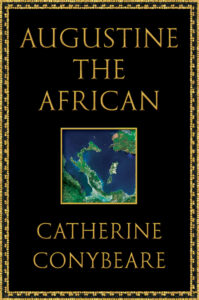It is tempting when reading Augustine’s Confessions to think one has been granted access to peer inside the author’s soul and thereby learned all there is to know about him as a person. However, contemporary biographies of Augustine – for instance, Peter Brown’s classic Augustine of Hippo: A Biography (1967) and James J. O’Donnell’s more subversive Augustine: A New Biography (2005) – illustrate that there is much to learn about Augustine’s life beyond what he tells us about his infancy, childhood, and early adult years in the Confessions. Catherine Conybeare’s new biography Augustine the African (2025) adds to scholarly efforts to puzzle through Augustine’s life and legacy by focusing on a relatively neglected aspect of his identity and reception: Augustine’s Africanness.
As Conybeare explains in the preface to her book, Augustine’s thought has been viewed as so fundamental in shaping Western Christianity that we seem to have ignored or forgotten that Augustine was not European but African. Throughout her biography, Conybeare offers a reading of Augustine’s life that takes seriously his insider-outsider status as a man from Roman North Africa who is trying to navigate systems of domination both in the Catholic Church and the Roman Empire. There is much to learn from the insider-outsider Conybeare uses to frame the biography and much to enjoy. I found myself at times feeling as though I were reading a novel; her knack for prose and storytelling abilities make this biography a pleasurable read.
 Augustine the African proceeds in four parts. In the first, Conybeare guides the reader through Augustine’s life as described in the Confessions. Anyone who has never read Augustine’s text before will be treated to a masterfully retold account of Augustine’s early years weaved together with just the right amount of historical context to help a contemporary reader make sense of his world. Those who are more familiar with Augustine’s story will see the Confessions through a new perspective, as Conybeare underscores what she sees in the text – particularly Augustine’s discussion of the Aeneid – that conveys his Africanness.
Augustine the African proceeds in four parts. In the first, Conybeare guides the reader through Augustine’s life as described in the Confessions. Anyone who has never read Augustine’s text before will be treated to a masterfully retold account of Augustine’s early years weaved together with just the right amount of historical context to help a contemporary reader make sense of his world. Those who are more familiar with Augustine’s story will see the Confessions through a new perspective, as Conybeare underscores what she sees in the text – particularly Augustine’s discussion of the Aeneid – that conveys his Africanness.
The rest of the biography takes us beyond the Confessions. The second part of the text, which I confess I found to be the most gripping part of the entire book, so much so that I could not put it down, details Augustine’s involvement in the 411 Council of Carthage and the Donatist controversy. Conybeare expertly identifies the tensions inherent to this period of Augustine’s life in which, despite his negative experiences in Italy and desire to return to Africa, Augustine chose to defend (even through the use of imperial force) the notion of a universal church against the local Donatist vision of an African church. Conybeare’s presentation of this entire episode of Augustine’s life is brilliant, even and perhaps especially as she challenges us to consider Augustine’s legacy of codifying and enforcing orthodoxy within the Church.
In part three, Conybeare demonstrates her skills as a philologist by describing the linguistic and rhetorical challenges Augustine experienced when trying to preach to and write for Punic-, Latin-, and Greek-speaking audiences from a range of social classes. In chapter 9, she describes a “terrible epistolary confrontation” (127) between Augustine and Jerome on what the best translation for the item (gourd? ivy? shrub?) God creates for Jonah. In one letter, Jerome concludes with a dig at Augustine’s Africanness (128). Attacks on Augustine’s heritage were a surefire way to goad him during debate; Conybeare also describes in chapter 14 how the Pelagian Julian resorted to snide comments about his Africanness in the course of their disagreement over original sin (214-15). Conybeare’s attention to these interactions and the way they must have shaped how Augustine saw the world and himself reminds us that, while today Augustine might be lumped in with European Christian traditions, in his own time he was very much viewed as African.
The final part of the biography focuses on Augustine’s life after the 410 sack of Rome. Conybeare describes how he came to rewrite the history of Rome and develop his idea of human life as pilgrimage in his magnum opus The City of God. Conybeare persuasively argues that the genius of that text – its ability to reveal the fragility of Roman imperialism while still offering a sense of community for those who feel lost – is where one can see “Augustine’s ambiguous status—both an African and a Roman, both outsider and insider— …most fully realized” (190). By turning our attention to Augustine’s Africanness, Conybeare offers us a new (but perhaps more recognizable to himself) portrait of Augustine.
 Augustine the African (2025) is now available for sale in hardcover from Liveright Publishing, an imprint of W. W. Norton & Company. Catherine Conybeare is the Leslie Clark Professor in the Humanities and Professor of Greek, Latin and Classical Studies at Bryn Mawr College. Her research focuses on late antiquity and the writings of Augustine of Hippo. Her other work on Augustine includes The Irrational Augustine (2006) and The Routledge Guidebook to Augustine’s Confessions (2016).
Augustine the African (2025) is now available for sale in hardcover from Liveright Publishing, an imprint of W. W. Norton & Company. Catherine Conybeare is the Leslie Clark Professor in the Humanities and Professor of Greek, Latin and Classical Studies at Bryn Mawr College. Her research focuses on late antiquity and the writings of Augustine of Hippo. Her other work on Augustine includes The Irrational Augustine (2006) and The Routledge Guidebook to Augustine’s Confessions (2016).
Colleen Mitchell
Colleen E. Mitchell is Associate Director of Outreach for the Augustinian Institute at Villanova University, and Assistant Teaching Professor in the Augustine and Culture Seminar Program.